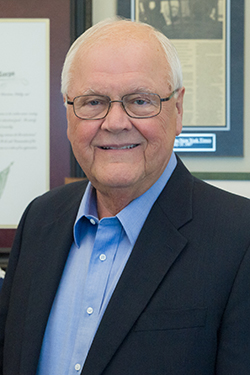
- About
- Humanities Networks
- Faculty
- Students
- Postdocs
- News & Events
Back to Top Nav
Back to Top Nav
Back to Top Nav
Back to Top Nav
Former Dartmouth President and history Professor James Wright, along with eight other retiring Arts & Sciences faculty members attended their last commencement on June 9, receiving acknowledgement and applause from the graduates of 2013 as they all begin new phases of their lives. Together, these teachers, scholars, and mentors have a combined 334 years of service to Dartmouth, and many say retirement is not the end of their work, but the start of a new phase.

Dartmouth President Emeritus James Wright. (Courtesy of James Wright)
James Wright, history
Wright, the 16th Dartmouth President in the Wheelock Succession, identified himself as an historian first throughout his 44 years at the College.
He served as president from 1998 to 2009, and held many other roles at Dartmouth including associate dean, dean of the Faculty of Arts and Sciences, acting president, and provost. But his first love was always teaching, said Barry Scherr, retiring professor of Russian who served as provost under Wright.
Scherr said Wright's course on the history of the American West, along with courses on United States political history and a survey of American history since the Civil War, were renowned among several generations of Dartmouth students.
"When Jim became president in 1998, someone calculated that he had taught 5 percent of all the living Dartmouth alumni (and of course a significantly higher percentage of those whose time at Dartmouth had coincided with his)," Sherr said. "And just this past winter he was again in the classroom, teaching a history seminar on America's wars and those who fought them."
Wright's interest in and support for veterans has roots in his own experience. He joined the Marine Corps right out of high school and was a miner before launching his career in academia. Then, three years after leaving the presidency, he published Those Who Have Borne the Battle: A History of America's Wars and Those Who Fought Them. Wright has worked to ensure veterans find the support and aid they need to continue their education.
"But his warmth and reaching out to others also appeared in countless smaller ways: holding informal chats with students on the Green or in Collis, providing encouragement and understanding to those with whom he worked," Scherr said. "In the often difficult decisions that had to be made as president there would be concern not just for the institution but also for the individuals who would ultimately be affected."
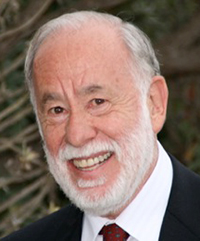
Martin Arkowitz (Courtesy of the Department of Mathematics)
Martin Arkowitz, mathematics
In 49 years in the Department of Mathematics, Arkowitz taught countless students in courses ranging from first-year calculus to advanced graduate courses and he has been the principal advisor to at least seven PhD students.
Arkowitz's specialty is algebraic topology, the study of the shape of objects in various dimensions.
"A running joke amongst mathematicians is that a topologist is a mathematician that can't tell the difference between a donut and a coffee cup," said Professor Dana Williams, a colleague in the math department. "The idea is that it is the hole in the handle or the middle of the donut that is important."
Arkowitz is a 1956 graduate of Columbia and received his PhD from Cornell in 1960. He came to Dartmouth in 1964 as an assistant professor, and has been a professor since 1971, and served as chair of the Department of Mathematics and Computer Science from 1981 to 1984. He has held a number of visiting university positions including at ETH Zurich, the University of California at Irvine, Oxford, University of Milan and the University of California, Santa Barbara.
Arkowitz's time in Italy changed him, or at least his name, said Williams.
"Martin spent a term in Italy about five years ago where the locals called him Martino," Williams said. "He liked it so much that he requested we all start calling him Martino."
Most recently, he wrote a graduate-level text, Introduction to Homotopy Theory, which Williams noted "will continue to influence not just Dartmouth graduate students, but students and faculty around the world."
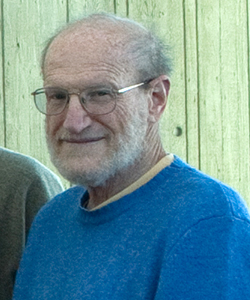
James Aronson (Photo by Joseph Mehling '69)
James Aronson, earth sciences
Aronson came to Dartmouth as a research professor in the Department of Earth Sciences in 1998, and has been a dedicated and active member of the department, as both a teacher and a contributor to departmental business, throughout his relatively short time at the College, said Associate Professor W. Brian Dade, chair of the Department of Earth Sciences.
"Jim is warmly regarded by not only his departmental colleagues, but as well by a generation of Dartmouth earth science majors for his breadth of knowledge of all things geological, as well as his upbeat personality, humility, natural curiosity, and his endearingly nonlinear thought process," Dade said.
Dade said in Aronson, the idea that a person encompasses all the stages of their life experience is especially evident.
"In a single conversation, he could be an absent-minded professor wondering where he parked his car, a gray-beard sage sharing hard-won wisdom, a mature student of nature with the inquiring mind and vigor of a mid-career scientist at the peak of his powers, or an exuberant child experiencing things for the first time with wonder and amazement," Dade said.
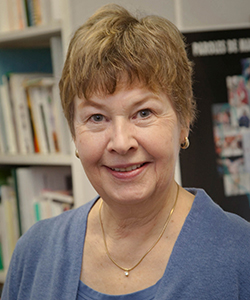
Mary Jean Green (Photo by Joseph Mehling '69)
Mary Jean Green, French and Italian
Green received her Ph.D. in French literature from Harvard and was hired at Dartmouth in the Department of French and Italian in 1973, in the first wave of women faculty after co-education, said Lynn Higgins, the Edward Tuck Professor of French and Comparative Literature and the associate dean of the faculty for international and interdisciplinary studies.
Green's interest in the politics of literature led her career toward women writers and feminist critique as well as the Francophone world outside France. As director of the Language Study Abroad program in Quebec City in 1978 and 1980, she was excited by the literature of Quebec and the politics of Quebec independence, later founding the American Council for Quebec Studies and launching the interdisciplinary journal Quebec Studies in 1982.
Her work and teaching then expanded to encompass works in French from Sub-Saharan Africa and the Maghreb. With Professor Keith Walker, she initiated the first courses at Dartmouth wholly devoted to Francophone literature, "which has now become an important part of our French major," Higgins said.
Green has also served as chair of the Women's Studies Program from 1981 to 1984, shortly after its founding. She was an associate dean of faculty for humanities and served as the French and Italian Department chair from 1991 to 1993. She was also a generous collaborator and mentor, Higgins said.
"Ours is a field where collaborative writing is still considered somewhat risky. We were advised against it," Higgins said. "Yet some of my fondest memories of Dartmouth involve sitting in Mary Jean's backyard hammering out a co-authored article while keeping an eye on her young son in his playpen. Matthew is now 37, and a lot of publications, both individual and collective, have their roots in those shared experiences!"
"Finally, Mary Jean has also been a great model in her ability to find and maintain that elusive work-life synergy," Higgins said. "I am confident she will continue to develop as a scholar in directions perhaps still to be discovered."
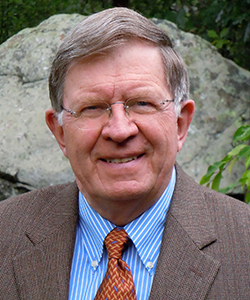
Gary Johnson (Courtesy of Gary Johnson)
Gary Johnson, earth sciences
Johnson joined the Department of Earth Sciences as an assistant professor in 1971. In his time at the College, he has supervised or co-supervised nearly three dozen undergraduate honors theses, more than two dozen master's theses and eight PhD dissertations, said Associate Professor W. Brian Dade, chair of the Department of Earth Sciences. Most of these student research activities were conducted overseas in places as far afield as Kenya, Honduras, India, and Pakistan, reflecting various aspects of Johnson's diverse research interests.
Johnson has served the Arts & Sciences on numerous committees including those dealing with the curriculum, off-campus activities, instruction, libraries, and graduate studies, as well as having served on the Task Force for Dartmouth Libraries of the 21st Century. Several of these he chaired.
He has also been active with the Institute for Lifelong Education at Dartmouth (ILEAD) as well as Dartmouth's Office of Alumni Relations, having led some 14 Dartmouth alumni continuing education programs both here and abroad.
Johnson increasingly focused on public service geological research and consulting, and worked closely with the U.S. Bureau of Land Management in developing educational and research protocols associated with paleontologically important public land resources in Wyoming and elsewhere. This work has also extended to assisting several natural history museums in Wyoming, Vermont, and New Hampshire in outreach development, as well as consulting for the States of Wyoming and New Hampshire on geologic resources.
"In recent years, Gary has brought his welcomed experience, insight, Midwestern level-headedness, and measured response to discussion and decision-making amongst our young faculty," Dade said. "In short, Gary has contributed to a couple generations of Dartmouth students and faculty alike in the best Dartmouth tradition."
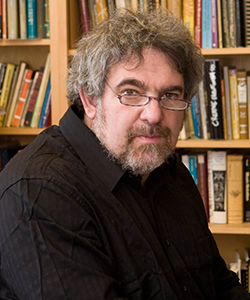
Larry Polansky (Photo by Joseph Mehling '69)
Larry Polansky, music
Polansky, the Jacob H. Strauss 1922 Professor in Music, was co-director of the Bregman Electronic Music Studio and was chair of the Department of Music from 1998 to 2003.
He has worked extensively in composition, computer music, software development, theory, performance, and American music. He is the author of a number of books and articles, has released several solo CDs, is an editor for a number of major theoretical and computer music journals, and is the founder and director of Frog Peak Music (a composers' collective), an organization dedicated to publishing speculative theory and experimental music. He most recently taught in the graduate program in electro-acoustic music, and courses in computer music, theory and composition on the undergraduate level.
"One of the most striking courses, and most recent, for me," said Polansky, "was the work I did with American Sign Language arts and culture here in the last few years."
He says that the collaboration, friendships, and community he found in his 22 years at Dartmouth are the essence of his career. Among the many things he will remember about his time at the College are "the graduate students, of course, 22 classes of them, comprising every possible permutation of personal, musical, creative, and technological experiences. What a ride."
Also important to Polansky are "the large number of close personal, scholarly, and creative connections with people here: too many to mention, but each one of them important in some unique way. One of the reasons I accepted this job 22 years ago was because I thought being at a small, high-quality university would make this kind of community possible, and it did so beyond my expectations. I'll miss a lot of specific people and the community in general," he said.
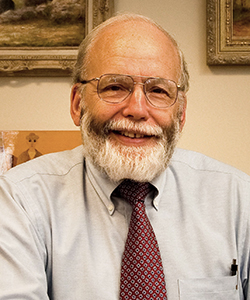
Barry Scherr (Photo by Joseph Mehling '69)
Barry Scherr, Russian
Scherr came to Dartmouth as an assistant professor of Russian in 1974. During his 38 years at Dartmouth he served as chair of the Department of Russian for a total of 10 years, was associate dean for the humanities, and was provost through most of the first decade of the 21st century. He was a key contributor in the founding of both the Leslie Center for the Humanities and the Dartmouth Center for the Advancement of Learning (DCAL). From 1997 until his retirement he held the Mandel Family Professorship.
One of the Foreign Study Programs he directed was in 1981, in the then Soviet Union (and in the city then called Leningrad). Professor Adrian Randolph, the Leon E. Williams Professor of Art History and a friend of Scherr, shared a note he received from a former student of Russian, Henry Pickford, now an assistant professor at the University of Colorado, Boulder.
"Henry recounts his experiences watching Barry during the summer of 1981 run a language program in Leningrad," Randolph said. "At a time of heightened tension between the U.S. and U.S.S.R., whenever he was speaking to his Soviet counterparts, Henry recalls, Barry always seemed to be rattling off 'da, da, da, da, da, da' (yes, yes, yes, yes, yes, yes) like a machine gun. I think we—and the Soviets—ran him a bit ragged. Saying yes to appease antagonists: what wonderful administrative training!"
Scherr has written extensively on the works of Maxim Gorky, Joseph Brodsky, filmmaker Sergei Eisenstein, and Anna Akhmatova, among others. "Barry mingles a strong sense of form with a certain deep appreciation for artistic struggle," Randolph said.
"Barry Scherr—with over 200 publications to his name, a reputation that has linked Russian and American academia, a professor and mentor of generations of students, and a colleague who has served Dartmouth in a remarkable range of administrative offices, rising to be its chief academic officer—has earned our respect and thanks," said Randolph.
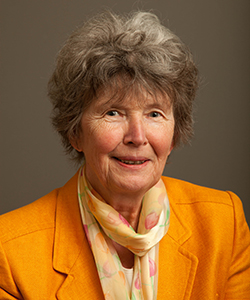
Heide Whelan (Photo by Joseph Mehling '69)
Heide Whelan, history
Whelan joined the Department of History at Dartmouth in 1973, serving as chair from 2002 to 2005. She taught a wide range of courses in the history of Russia and Eastern Europe, participated in the Modern European Survey in the history department, and developed one of the first truly interdisciplinary courses at Dartmouth, the "Introduction to the Soviet Union," team-taught with colleagues in the government, geography, and Russian departments, said history Professor Walter Simons.
As a historian, Whelan devoted much of her work to the study of empires in decline, including works examining the failure of the reign of Czar Alexander III and the decline of Baltic German nobility in the modern era.
Whelan's personal history informed her work, Simons said. Born in Lubeck, in northern Germany, a few months after the Royal Air Force struck the town in a test of firebombs. She recalled at the end of World War II, when Russian tanks lined up just a few miles east of her home, Simons said.
"The history of war naturally came to occupy an important place in Heide's teaching at Dartmouth," Simons said. She developed two courses that became mainstays in the department, a 'History of World War II,' and the 'History of Warfare,' in which she integrated military theory and strategy, technological change, and economics to draw a picture of total war in the modern age.
"And I suppose her experiences in life also explain her philosophy of history. After all, if your existence might have been very different had you been born 30 miles further west, or 30 miles further east, a certain amount of skepticism toward grand theories seems indicated," Simons said. "We want to thank her for her years of service, for being a wonderful colleague, a straight shooter throughout, in short, for keeping things real."
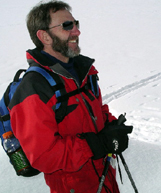
George Wolford (Courtesy of the Department of Psychological and Brain Sciences)
George Wolford, psychological and brain sciences
Wolford, the Lincoln Filene Chair Emeritus in the Department of Psychological and Brain Sciences, came to Dartmouth in 1969, was chair of the department from 1986 to 1993, and was dean of the social sciences from 1993 to 1997. His degree is in mathematical psychology, and his work at Dartmouth has focused on judgment and decision making in memory and choice, said Professor Jay Hull, chair of Psychological and Brain Sciences.
While Wolford has many publications, was invaluable to his department, and is a vibrant teacher, Hull said that he preferred his tribute to focus on Wolford's "ignobelity."
"For those of you who are not aware, George was an Ig Nobel award winner this past year. Patterned on the Nobel Awards, the Ig Nobel awards are given in specific categories to research that makes you laugh and then makes you think," Hull said.
Wolford's winning study involved plotting blood flow in the brain over time to detect areas that light up the pixels on an MRI screen, showing statistically significant change. "Unfortunately, if you conduct enough statistical tests, something will be significant just by chance," Hull said.
To illustrate, Wolford conducted a series of MRIs and found areas of the brain that lit up.
"The problem was that the scan was of a dead salmon. Frozen, actually," Hull said. "Then they showed that performing a simple statistical procedure eliminated these 'false positives.' The title of the article is 'Neural Correlates of Interspecies Perspective Taking in the Post-Mortem Atlantic Salmon: An Argument for Proper Multiple Comparisons Correction' and it was published in the Journal of Serendipitous and Unexpected Results."
"This research captures an essence of George," Hull said. "One of my colleagues notes that 'Some people in science would rather be right than interesting and others would rather be interesting than right.' George's research tries to make sure that people are right before they are allowed to be interesting."